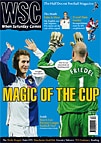 The rapid growth of internet sites seemingly beyond the reach of the Premier League’s lawyers is allowing fans the chance to watch their team live online. Martin del Palacio Langer goes surfing
The rapid growth of internet sites seemingly beyond the reach of the Premier League’s lawyers is allowing fans the chance to watch their team live online. Martin del Palacio Langer goes surfing
Last May, the Premier League sued YouTube for “having knowingly misappropriated its intellectual property by encouraging footage to be viewed on its site”. The case has not yet been resolved but, as a result of the lawsuit, images of recent matches have disappeared from the site, which now actively tracks and eliminates any videos even remotely related to what is occurring in English stadiums. However, this measure has not meant that football fans around the world have lost their only opportunity of watching the best moments of their favourite matches online. The fall of the popular Google video page gave way to the rise of other sites with even more effective systems, which present highlights online minutes after a game has ended.